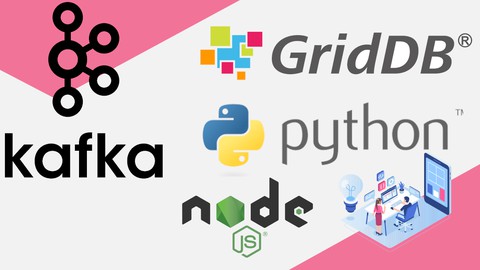
Create a working IoT Project – Apache Kafka, Python, GridDB
Create a working IoT Project – Apache Kafka, Python, GridDB, available at Free, has an average rating of 4.4, with 16 lectures, based on 18 reviews, and has 2219 subscribers.
You will learn about Learn about the technology stack for building an IoT web app Learn about the recommended data storage for storing IoT data Learn how to visualize and create an Iot web app with nodejs How to run various technologies in unison with docker compose This course is ideal for individuals who are Developers interested in IoT or data analysis or learning new databases It is particularly useful for Developers interested in IoT or data analysis or learning new databases.
Enroll now: Create a working IoT Project – Apache Kafka, Python, GridDB
Summary
Title: Create a working IoT Project – Apache Kafka, Python, GridDB
Price: Free
Average Rating: 4.4
Number of Lectures: 16
Number of Published Lectures: 16
Number of Curriculum Items: 16
Number of Published Curriculum Objects: 16
Original Price: Free
Quality Status: approved
Status: Live
What You Will Learn
- Learn about the technology stack for building an IoT web app
- Learn about the recommended data storage for storing IoT data
- Learn how to visualize and create an Iot web app with nodejs
- How to run various technologies in unison with docker compose
Who Should Attend
- Developers interested in IoT or data analysis or learning new databases
Target Audiences
- Developers interested in IoT or data analysis or learning new databases
This course aims to teach you about building an IoT platform with a real-life, hands-on project!
We will begin by utilizing GridDB to create an IoT project which will simulate data from IoT Sensors, stream that data through Kafka, sent to GridDB, and then utilized in a variety of ways, including a real-time data visualizer. The data visualizer will be made up from node.js.
In the first parts of the course, we will delve into what Docker is and how it ties into this project; in our case, we have containerized all different aspects of the project to be able to easily share everything, with the added benefit of teaching more about using docker in conjunction with Kafka, GridDB, Jupyter Notebook, etc.
Next, we will talk about Kafka (outside of the context of Docker), what it is, what it does, and how it ties into ours and other IoT projects’ workflows. In our case, Kafka handles data streaming from sensors to GridDB, adding reliability, stability, and robustness. From there, we talk about how to build a small python script to be simulate an IoT gateway, which teaches how to send data from somewhere, through Kafka and finally through to GridDB.
After that, we go through and discuss using java to code an bill report-generation application which pulls all data from our database. Next up is data visualization: we will introduce the GERN stack and show you how to query data from GridDB using nodejs to create real-time data charts.
And lastly we will showcase using Python and jupyter to do some data analysis of your GridDB data.
Course Curriculum
Chapter 1: Introduction
Lecture 1: Introduction
Chapter 2: Prerequisites, Docker, and Overview
Lecture 1: Docker Overview
Lecture 2: Resources
Lecture 3: Running Docker and Docker Compose Hands-On
Chapter 3: Data Persistence – GridDB
Lecture 1: GridDB's Merits
Lecture 2: Installing and Using GridDB
Chapter 4: Data Streaming – Kafka
Lecture 1: Kafka Overview
Lecture 2: Kafka Hands-On
Chapter 5: Gateway Simulator
Lecture 1: Gateway Simulator Introduction
Lecture 2: Gateway Simulator Hands-On
Chapter 6: Bill Job
Lecture 1: How to build a bill- report generation java application using GridDB
Lecture 2: Bill Job Hands-On
Chapter 7: Data Visualization with GERN Stack
Lecture 1: What is the GERN Stack
Lecture 2: GERN Stack Hands-On
Chapter 8: Data Analysis with Python and GridDB
Lecture 1: Data Analysis with GridDB and Python
Lecture 2: Data Analysis Hands-On
Instructors
-
Israel Imru
Developer
Rating Distribution
- 1 stars: 0 votes
- 2 stars: 0 votes
- 3 stars: 2 votes
- 4 stars: 6 votes
- 5 stars: 10 votes
Frequently Asked Questions
How long do I have access to the course materials?
You can view and review the lecture materials indefinitely, like an on-demand channel.
Can I take my courses with me wherever I go?
Definitely! If you have an internet connection, courses on Udemy are available on any device at any time. If you don’t have an internet connection, some instructors also let their students download course lectures. That’s up to the instructor though, so make sure you get on their good side!
You may also like
- Best Yoga Instruction Courses to Learn in March 2025
- Best Stress Management Courses to Learn in March 2025
- Best Mindfulness Meditation Courses to Learn in March 2025
- Best Life Coaching Courses to Learn in March 2025
- Best Career Development Courses to Learn in March 2025
- Best Relationship Building Courses to Learn in March 2025
- Best Parenting Skills Courses to Learn in March 2025
- Best Home Improvement Courses to Learn in March 2025
- Best Gardening Courses to Learn in March 2025
- Best Sewing And Knitting Courses to Learn in March 2025
- Best Interior Design Courses to Learn in March 2025
- Best Writing Courses Courses to Learn in March 2025
- Best Storytelling Courses to Learn in March 2025
- Best Creativity Workshops Courses to Learn in March 2025
- Best Resilience Training Courses to Learn in March 2025
- Best Emotional Intelligence Courses to Learn in March 2025
- Best Time Management Courses to Learn in March 2025
- Best Remote Work Strategies Courses to Learn in March 2025
- Best Freelancing Courses to Learn in March 2025
- Best E-commerce Strategies Courses to Learn in March 2025






















